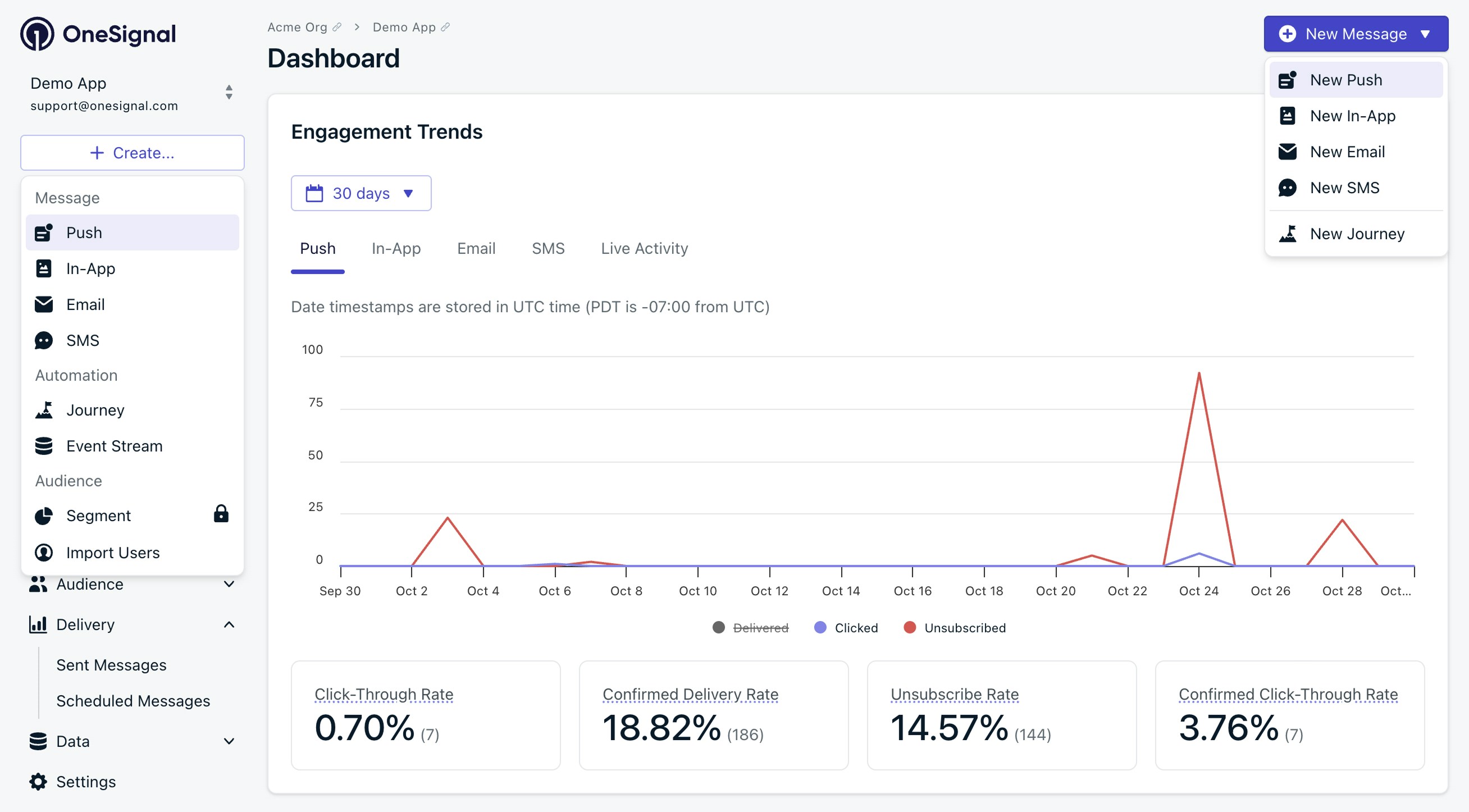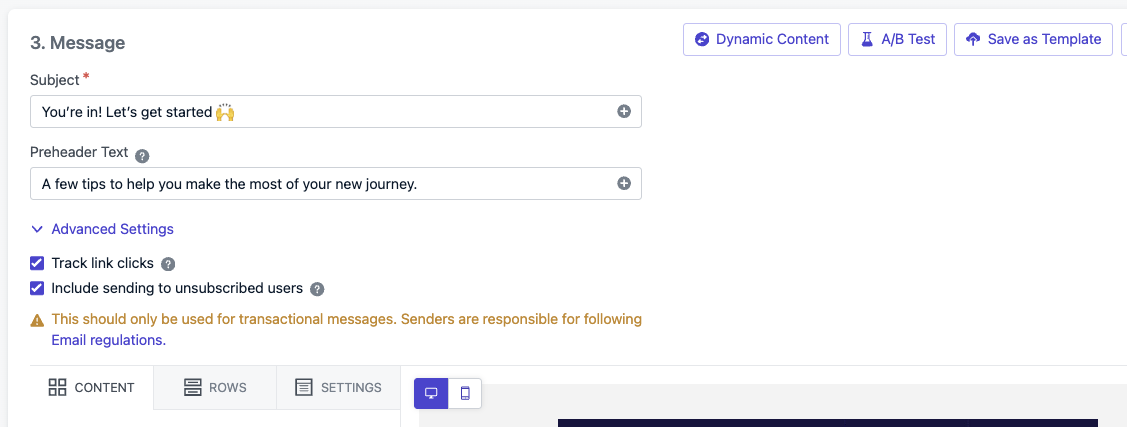- Send marketing campaigns and transactional messages from the Dashboard or API
- Build automated email and multi-channel flows with Journeys
- Design emails using a Drag & Drop or HTML
- Personalize content with dynamic fields, conditional logic, and language variants
- Track performance & A/B test with detailed analytics
- Segment your audience for precise targeting
- Integrate with CRMs & tools like HubSpot, Mixpanel, Amplitude, Zapier, and more
Email setup
Before sending emails, follow our quick setup guides:Email setup guide
Verify your sending domain and enable email in OneSignal.
DNS configuration
Automatically configure DNS with one click or complete setup manually.
Senders
Manage from names, from addresses, reply-to addresses, and multiple sending domains.
Email Template Forwarding
Easily import existing email templates by forwarding them directly to OneSignal.”
Transactional email setup
Trigger emails based on user actions or custom events.
Custom unsubscribe pages
Replace the default unsubscribe page using OneSignal APIs.
Deliverability, reputation, & analytics
Deliverability determines whether your emails reach the inbox or land in spam. OneSignal provides tools and guidance to help you build and maintain a healthy sending reputation.Email deliverability
Understand how inbox placement works and how OneSignal supports it.
Email reputation best practices
Learn how to warm domains, manage volume, and avoid spam filters.
Auto Warm-Up
Automatically ramp sending volume for new domains.
Google Postmaster Tools
Monitor Gmail reputation and delivery signals.
Suppressions
Manage blocked and suppressed email addresses.
Email message reports
Track open, click, and conversion rates.
Email troubleshooting
Diagnose and resolve common delivery issues.
Design your emails
You can create and manage email content using several approaches:Drag & Drop editor
Build emails visually without writing code.
HTML editor
Design fully custom emails using HTML.
Templates
Start from pre-built templates or create and save your own layouts.
Email template forwarding
Import existing email templates by forwarding them to OneSignal.
Unsubscribe links & headers
Control unsubscribe behavior, headers, and compliance settings.
Message personalization
Personalize content using user data and conditional logic.
Multi-language messaging
Send localized emails in multiple languages.
Send emails
You can send emails in different ways depending on your use case.Journeys
Build automated, multi-channel flows.
A/B testing
Test up to 10 email variants within the dashboard.
Send via API
Send emails programmatically using the REST API.
Transactional emails
Learn how to trigger emails based on user actions or events.
Send an email from the dashboard
Use the steps below to send an email campaign from the OneSignal dashboard.Select the email channel
- Select + Create… > Email or New Message > New Email.
- View previous messages under Messages > Email.

Choose a composition method
- Use the Drag & Drop editor or HTML editor.
- Start from a template or saved layout.
Choose your audience
Select which users are eligible to receive the email.
- Default: all subscribed users
- You can include or exclude multiple segments (OR logic)

Sender settings
Configure the sender details used for this email:- From name
- From address
- Reply-to address
- Sending domain
Multi-domain sending is supported. See Senders.
email_from_addressemail_sender_domainemail_reply_to_address
Subject & preheader
Set a required subject line and optional preheader text.- API fields:
email_subjectandemail_preheader - Supports: Emojis 👍 (may be limited by inbox provider), Message Personalization, Multi-language messaging
- Note that not all inboxes display the preheader text.
Tracking & compliance options
Link tracking - Enabled by default. Supports multi-link tracking.- See Links and Deep Linking for more details.
- API field:
disable_email_click_tracking
- Enable this option only for compliance or non-marketing messages.
- API field:
include_unsubscribed

Delivery schedule & optimization
Choose when and how emails are delivered:- Send immediately
- Schedule a specific time (up to 30 days in advance)
- API field:
send_after
- API field:
- Auto Warm-Up for gradual volume increases
- Send to everyone at the same time: Best for urgent messages.
- Intelligent Delivery: Optimizes send times based on the user’s email activity patterns (opens, clicks from humans, not bots).
- API field:
delayed_option: last-active
- API field:
- Custom Time per User Timezone: Sends at a set time in each user’s timezone (fallback available).
- API fields:
delayed_option: timezone&delivery_time_of_day
- API fields:
Finalize & send
- The “start sending” time is the cutoff point for users to enter/exit the audience segments. Anyone in the audience at this time will be sent the message and it does not depend on the “per user optimization” options.
- Click Review & Send or Save as Draft to edit later.
You’re ready to start sending emails with OneSignal!Next steps:
- Learn about Email deliverability and Reputation best practices.
- Explore HTML Design Options or the Drag and Drop Editor.
- Learn about Message Personalization.
- Manage Unsubscribe Links & Email Subscriptions.